

Evaluation of Mentoring Best Practices Tool Kit with appended surveys 2007. 10. Executive Officer, CONNECT, 163 Eastern Road, South Melbourne, Vic 3205, Australia.
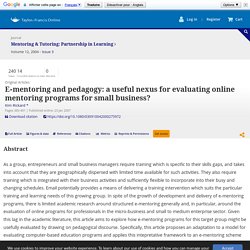
Email: connect@apesma.asn.au Unpublished data arising out of Waite, M. and Will, L. (2001), Self‐employed contractors in Australia: incidence and characteristics, Productivity Commission Staff Research Paper, Aus. Info., Canberra. Cited at p. 7, Rickard, K. In May 2002, Dr L. Reeves, T. (1997 Reeves T 1997 Evaluating what really matters in computer‐based education, University of Georgia Available at, [Google Scholar]) Evaluating what really matters in computer‐based education, University of Georgia. Idem., p. 253: ‘this approach may cause the BC to feel that the sessions may “meander”’. ABS figures cited in Hartshorn, T. The Mentoring Competency Assessment: Validation of a New Instrument to Evaluate Skills of Research Mentors. Primikiri Athina. ΔΙΠΛΩΜΑΤΙΚΗ ΕΡΓΑΣΙΑ ΑΝΑΣΤΑΣΙΑ ΣΚΟΡΔΑ. 929 3193 1 PB. Πλαίσιο Δεξιοτήτων Μέντορινγκ - PDF ΔΩΡΕΑΝ Λήψη.
B 126 205 213. Error - Cookies Turned Off. Virtual exchange, or telecollaboration, is a term used to refer to the sustained engagement of groups of learners in online intercultural interaction and collaboration projects with partners from other cultural contexts or geographical locations as an integrated part of their educational programmes.
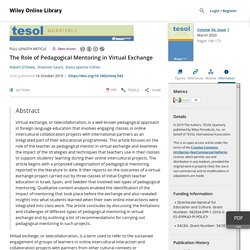
In recent years, virtual exchange has become an important part of online approaches to international education (De Wit, 2016; Lewis & O’Dowd, 2016). In foreign language education, telecollaborative models of exchange, principally informed by sociocultural and interactionist theories of language acquisition, have focussed on structuring interaction in order to facilitate negotiation of meaning with native speakers or to provide authentic experiences of intercultural communication with speakers of other languages (Dooly, 2017).
Virtual exchange has grown dramatically in popularity in recent years. However, the application of virtual exchange has not been without its critics (O'Dowd, 2016). (PDF) Online Self-Regulated Learning Questionnaire in a Russian MOOC. The learning opportunities that Massive Open Online Courses (MOOCs) promote urge more research in self-regulated learning to enhance student engagement.
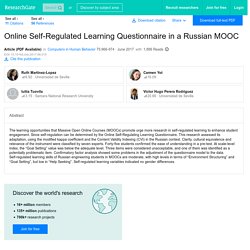
Since self-regulation can be determined by the Online Self-Regulating Learning Questionnaire. This research assessed its adaptation, using the modified kappa coefficient and the Content Validity Indexing (CVI) in the Russian context. Clarity, cultural equivalence and relevance of the instrument were classified by seven experts. Forty-five students confirmed the ease of understanding in a pre-test.
At scale-level index, the “Goal Setting” value was below the adequate level. 187 009967. Converting theory to practice: university school collaboration on. "Converting theory to practice: university-school collaboration on devi" by Peter Hudson and Suzanne Hudson. Publication details Hudson, P & Hudson, S 2011, 'Converting theory to practice: university-school collaboration on devising strategies for mentoring pedagogical knowledge', International Journal of Learning, vol. 18, no. 2, pp. 319-329.
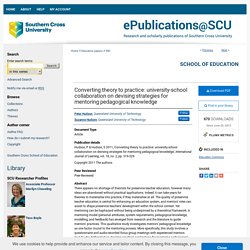
Copyright 2011 The authors. Peer Reviewed. The Coaching and Mentoring Network. Hudson forming mentor mentee relationships. Five stages of mentoring relationship development: Stage 5 – Redefinition - MSU Extension. Redefinition is the fifth and final stage of a mentoring relationship between the mentor and mentee.
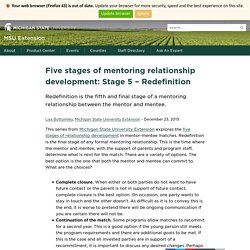
This series from Michigan State University Extension explores the five stages of relationship development in mentor-mentee matches. Redefinition is the final stage of any formal mentoring relationship. This is the time where the mentor and mentee, with the support of parents and program staff, determine what is next for the match. There are a variety of options. The best option is the one that both the mentor and mentee can commit to. Complete closure. Each party should take time to think about the various options and determine what is right for themselves moving forward. Other articles in this series Did you find this article useful? Mentoring and coaching. Estimated time required to complete module: 8 hours Estimated time required to complete unit: 4 hours Resources.
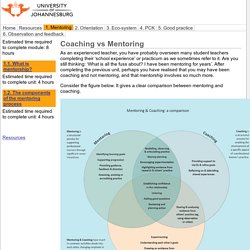
1 s2.0 S1877042814026081 main. 1 s2.0 S1877042815001354 main. c448315ae906b8b33c344a8aab23993cc8a9. E mentoring for e learning development. E mentoring for e learning development. Self Regulated Learning and Academic Achievement A. Self Regulation and E Learning. 1 s2.0 S1877042812054249 main. Τελειο !!! μεντορινγκ. 10 typoi mentoring. Morfes mentoring. Διπλωματική Μπρονόβσκι Μαρία 2019. Μελέτες περίπτωσης. The National Research Center on the Gifted and Talented (1990-2013) Three cyclical phases seem to emerge in the acquisition of self-regulation skills.
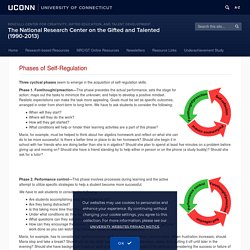
Phase 1. Forethought/preaction—This phase precedes the actual performance; sets the stage for action; maps out the tasks to minimize the unknown; and helps to develop a positive mindset. Realistic expectations can make the task more appealing. Goals must be set as specific outcomes, arranged in order from short-term to long-term. We have to ask students to consider the following: When will they start? Maria, for example, must be helped to think about her algebra homework and reflect on what she can do to be more successful. Phase 2. We have to ask students to consider the following: Are students accomplishing what they hoped to do? Maria, for example, has to consider her performance in math as opposed to other content areas. Phase 3. Did they accomplish what they planned to do? Maria might ask, “What did I do differently?” A Review of Self-regulated Learning: Six Models and Four Directions for Research. ED539959.
Assessing students self regulatory skills. Mentoring University. R 0405. Handbook of Research on Education and Technology in a Changing Society. Main. Main. Main. 1409 published. E-mentoring Activities in Online Programming Communities: An Empirical Study on Stack Overflow. TeachUP D1.1b Self Regulated Learning Online. Determining the Quality and Impact of an E Mentoring Model on At. Edulearn11 final yamada. Self-Regulated Learning - an overview. Metacognition and self-regulation. Metacognition and self-regulation approaches aim to help pupils think about their own learning more explicitly, often by teaching them specific strategies for planning, monitoring and evaluating their learning.
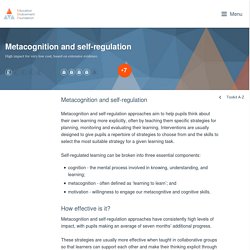
Interventions are usually designed to give pupils a repertoire of strategies to choose from and the skills to select the most suitable strategy for a given learning task. Self-regulated learning can be broken into three essential components: cognition - the mental process involved in knowing, understanding, and learning;metacognition - often defined as ‘learning to learn’; andmotivation - willingness to engage our metacognitive and cognitive skills. How effective is it? Metacognition and self-regulation approaches have consistently high levels of impact, with pupils making an average of seven months’ additional progress. The evidence indicates that teaching these strategies can be particularly effective for low achieving and older pupils.
How secure is the evidence? Guidance report. MENTORING HANDBOOK final version. DOE Mentoring Guidance Pgrm Plan2 0. Bestpractices mentoring. Trainer icse2017 ementoringSE. What are the Strategic Support Units? Mentoring Phases and Outcomes. Toward a Conceptual Model of Mentoring Research: Integration with Self-Regulated Learning. 2019 Reviews of the Most Popular Tools & Systems. Online Mentoring Platform Development: Tips To Create A Mentor App.
304230 a guide for mentors. Readings. Skip to main content You are currently using guest access (Login) Page path.
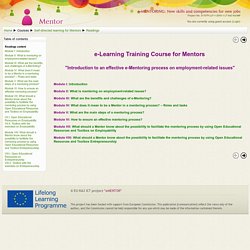
Free Personality Test. Self-directed learning for 3M actors. Mentoring University — Mentoring Complete. Introduction to Mentoring Programme. SET has developed an Introduction to Mentoring programme for its members in conjunction with Proversity, to provide an introduction to mentoring to enable you to develop practical skills to support you in your role as a mentor.
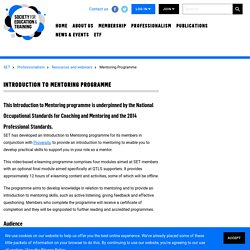
This video-based e-learning programme comprises four modules aimed at SET members with an optional final module aimed specifically at QTLS supporters. It provides approximately 12 hours of e-learning content and activities, some of which will be offline. The programme aims to develop knowledge in relation to mentoring and to provide an introduction to mentoring skills, such as active listening, giving feedback and effective questioning. Members who complete the programme will receive a certificate of completion and they will be signposted to further reading and accredited programmes.
Audience The programme is for those whose role involves supporting recently qualified teachers, as well as experienced teachers working in FE and skills settings. Course Syllabus Join. Art of Mentoring - Online Training and Support for Mentors & Mentees. Ims2018 morita. Aleksiou. Stamouli Anna Athina. E-Mentoring. Online mentoring, often referred to as electronic or e-mentoring, has grown in popularity as advances in social media and online communication over the last 20 years have given both young people and youth-serving organizations increasing ability to move the work of mentors into the virtual world.
Online mentoring is frequently offered to isolated groups of youth as a way of offsetting their distance from potential mentors. It is also increasingly used in traditional mentoring programs to supplement and augment face-to-face interactions (iMentor is a good example of a program that takes this blended approach). Most e-mentoring is delivered asynchronously, that is with some delay between the exchange of messages between mentor and mentee, as would be found in most email, message board, chat, or text functions using computers or mobile devices. What does the research say about E-Mentoring? What does the NMRC offer on E-Mentoring? Broad Evidence Reviews. Affordances of New Digital Technologies WangNg Ch5 Springer 2015.
Finalreport.